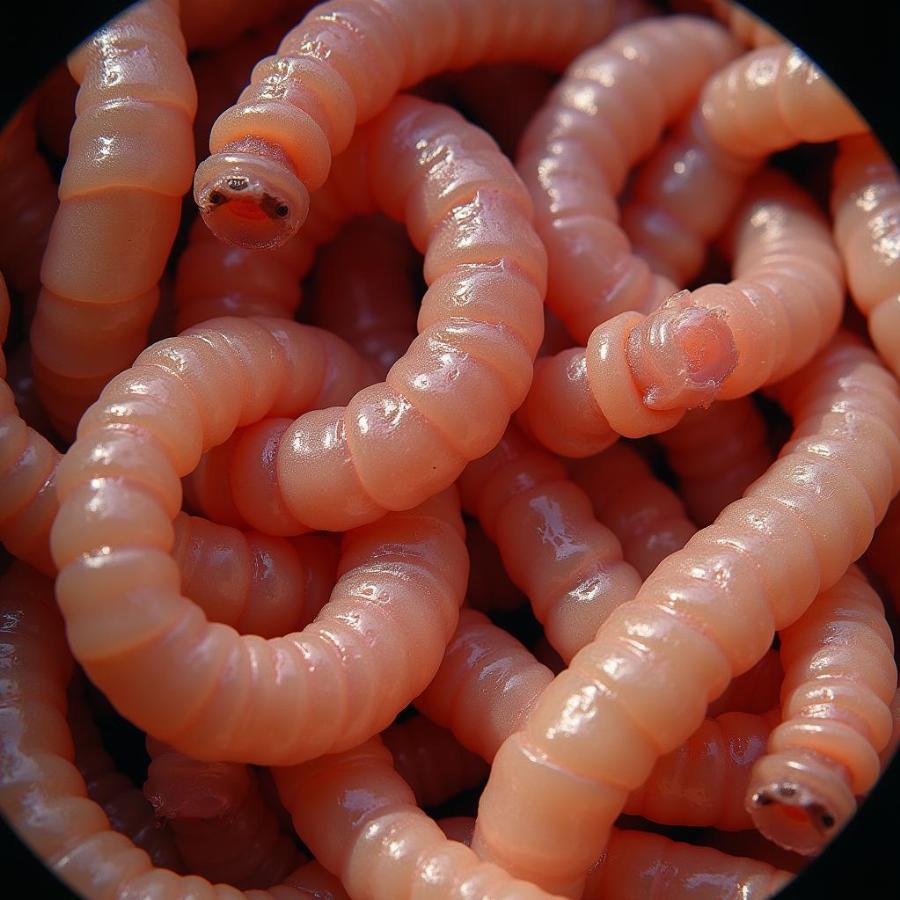Hookworms in dogs are intestinal parasites that can cause serious health problems, especially in puppies. These tiny, blood-sucking worms thrive in warm, moist environments and can infect dogs through ingestion of larvae or penetration of the skin. Understanding the lifecycle, symptoms, diagnosis, and treatment of hookworms is crucial for responsible dog ownership.
Understanding Hookworms in Dogs
 Ký sinh trùng Hookworm ở chó
Ký sinh trùng Hookworm ở chó
Hookworms are aptly named due to their hooked mouths, which they use to latch onto the intestinal wall and feed on blood. This blood loss can lead to anemia, especially in puppies. Female hookworms can produce thousands of eggs daily, which are passed in the dog’s feces and contaminate the environment. These eggs develop into larvae, which can then infect other dogs. Hookworm infections can occur through ingestion of contaminated soil, water, or feces, or by larvae directly penetrating the skin.
Signs of Hookworms in Dogs: What to Watch For
Hookworm infections can range from mild to severe. Early signs of hookworms in dogs often go unnoticed. However, as the infestation progresses, you might observe:
- Anemia: Pale gums, lethargy, and weakness are classic signs of anemia caused by blood loss.
- Digestive Issues: Diarrhea, sometimes with blood, can be a symptom of hookworms.
- Skin Irritation: If the larvae penetrate the skin, they can cause itching and inflammation, especially between the toes.
- Poor Growth: In puppies, hookworm infections can stunt growth and development.
- Respiratory Problems: In severe cases, migrating larvae can cause coughing and respiratory distress.
Diagnosing Hookworms in Dogs
Veterinarians diagnose hookworms by examining a stool sample under a microscope to detect hookworm eggs. A fecal flotation test is the most common diagnostic method used. Early diagnosis is crucial to prevent complications, especially in vulnerable puppies. hookworms in dogs treatment should be sought immediately upon diagnosis.
Hookworms in Dogs Treatment and Prevention
Treatment for hookworms typically involves deworming medications prescribed by a veterinarian. These medications effectively eliminate adult worms. Multiple doses are often necessary to kill all worms at different life stages. signs of hookworms in dogs can help you determine if your dog may need to be tested.
Prevention is key in managing hookworm infections. Regularly cleaning up your dog’s feces, especially in areas frequented by other dogs, is crucial. Preventative medications are also available and can be administered monthly to protect your dog from hookworms and other intestinal parasites. what do hookworms look like in dogs can be an important resource for understanding this parasite.
How do dogs get hookworms?
Dogs can become infected with hookworms through several ways: ingesting larvae from contaminated soil, water, or feces; through the mother’s milk to puppies; or by larvae penetrating the skin, often between the toes.
What do hookworms look like?
Hookworms are small, thin worms, typically less than an inch long, with a hook-like mouth. They are difficult to see with the naked eye. hook worms in dogs symptoms are often more noticeable than the worms themselves.
Are hookworms contagious to humans?
Yes, hookworms can be transmitted to humans. Larvae in contaminated soil can penetrate human skin, causing a condition known as cutaneous larva migrans. Practicing good hygiene, such as wearing shoes in areas where dogs defecate, can minimize the risk of infection. hook worms in dogs is a serious condition that requires veterinary attention.
Conclusion
Hookworms are a serious health threat to dogs, especially puppies. Understanding the signs, diagnosis, and treatment of hookworm infections is vital for responsible dog ownership. Regular veterinary check-ups, preventative medications, and good hygiene practices are essential in protecting your dog from these harmful parasites.
FAQ
- How often should I deworm my dog for hookworms? Follow your veterinarian’s recommendations. Puppies require more frequent deworming than adult dogs.
- Can hookworms be fatal? Yes, especially in puppies, untreated hookworm infections can lead to severe anemia and death.
- Can I treat hookworms myself? Always consult a veterinarian for diagnosis and treatment. Over-the-counter dewormers may not be effective against all types of hookworms.
- How can I prevent hookworm infections in my yard? Regularly remove dog feces and consider using a larvicide to kill hookworm larvae in the environment.
- Are there natural remedies for hookworms? While some natural remedies are touted, it’s best to consult a veterinarian for safe and effective treatment options.
- Can hookworms be transmitted through grooming? While less common, hookworm larvae can be present on a dog’s fur and potentially transmitted during grooming.
- What is the life cycle of a hookworm? Hookworms have a complex life cycle involving eggs, larvae, and adult worms. Understanding this cycle is key to effective prevention and treatment.
Beaut Dogs is your trusted source for all things dog-related. We offer comprehensive information on dog breeds, care, and health. For specific advice on hookworms and other canine health concerns, please contact us via Email: [email protected]. Beaut Dogs is committed to providing accurate and reliable information to help you care for your beloved canine companion.